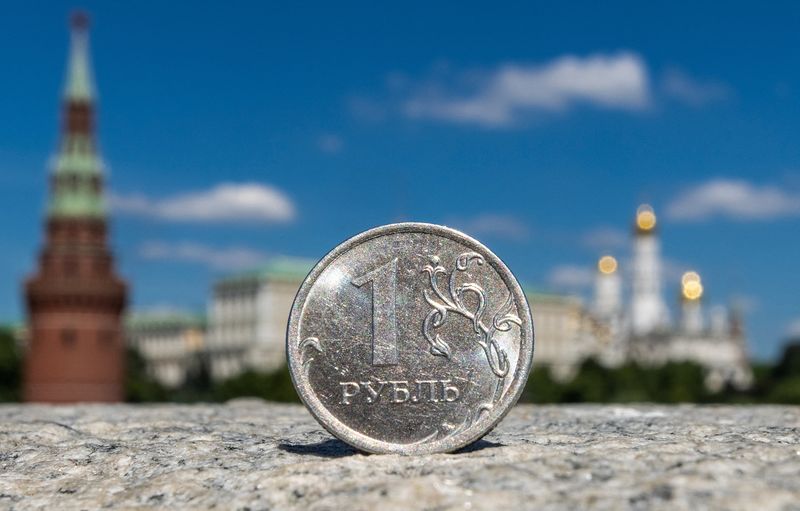Rouble hits multi-month low on Ukraine escalation fears
2022.10.11 08:29
[ad_1]

© Reuters. A Russian one rouble coin is pictured in front of the Kremlin in Moscow, Russia, in this illustration picture taken June 24, 2022. REUTERS/Maxim Shemetov/Illustration
MOSCOW (Reuters) – The Russian rouble slumped to a more than three-month low and within a whisker of 64 to the dollar on Tuesday, hurt by escalating geopolitical risks linked to the conflict in Ukraine and reduced supply of foreign currency among exporters.
By 1201 GMT the rouble was down 1.2% against the dollar at 63.44 after touching 63.9975 for its weakest since July 7.
It had lost 1.5% to trade at 62.31 versus the euro and shed 1.1% against the yuan to 8.75.
“During the session we expect continued pressure on the rouble against the backdrop of lower supply of foreign currency from exporters,” Banki.ru analyst Bogdan Zvarich said in a note.
The rouble has been supported by capital controls and a collapse in imports since Western sanctions were imposed over Russia’s actions in Ukraine and companies left the market in droves.
Addressing parliament on Tuesday, the Bank of Russia Deputy Governor Alexei Zabotkin said that capital controls, which have been partially eased since Russia sent troops into Ukraine, could be brought back in full “if acute risks to financial stability materialise again”.
Promsvyazbank analyst Yevgeny Loktyukhov pointed to escalation in Ukraine and a pullback in oil prices as a reason for the rouble’s slide.
, a global benchmark for Russia’s main export, was down 1.7% at $94.58 a barrel at 1200 GMT.
Russian stock indexes, which were dragged sharply lower by Gazprom (MCX:) in the previous session, were regaining some ground.
The dollar-denominated RTS index firmed by 0.1% to 964.8 points while the rouble-based MOEX Russian index was up 1.3% at 1,942.5 points.
Excluding Gazprom, the market was gaining for the second day running, said Dmitry Skryabin, portfolio manager at Alfa Capital.
The European Union’s eighth sanctions package had turned out to be less severe than expected in terms of a ban on ferrous metals products, he added.
[ad_2]
Source link








